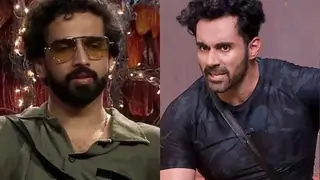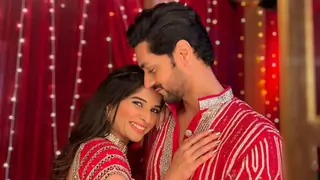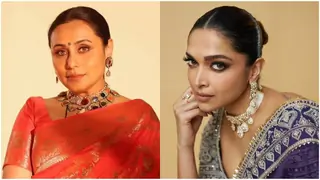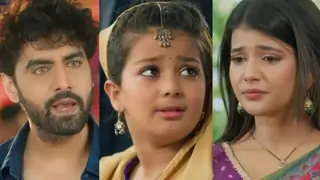Here's another article from TFM magazine Jan 06.
Artist of the Month: AR Rahman
By Thiru
As we step into another year with more expectations, lets relive the past as well as enjoy the present with this artist of the month. Yes, the artist of this month is still going strong and is a pride of TFM. Its none other than our own A.R. Rahman.
A. R. Rahman(originally named as A.S. Dileep Kumar) or Allah Rakha Rahman was born on the 6th of January in the year 1967, in Madras. His father R.K. Sekhar was a composer, arranger and conductor in Malayalam movies and had worked under the likes of Salil Chowdhary and Devarajan. His mother was Kasthuri (now Kareema Begum). Dileep's baptism in music happened early in life. Dileep's earliest memories of the studio are with his father. On one of those visits, a music director Sudarshanam Master found the four year old playing a tune on the harmonium. Sudarshanam Master covered the keys with a cloth. It made no difference. Dileep replayed the tune effortlessly. This impressed the music director who suggested that he be trained in music. Dileep started learning the piano at the tender age of four. He received his early training in music from Dhanraj Master.
But he wanted to grow up to be an electronics or computer engineer. He says today, in reminiscence " I was not crazy after music. I was more interested in technology". He was first drawn to music strongly when his father bought a synthesiser, one of the very first in film circles then, from Singapore. "Till then", he now says, "As a child, music seemed to be a means of earning bread and butter. I had no special fascination for it... it was associated purely with work. Yet I couldn't take my eyes away from the synthesiser, it was like a forbidden toy." This instrument was an object of much curiosity to the young Dileep and caught his fancy. Dileep used to spend hours experimenting with the novel instrument. This instrument was to shape the future of this child. It was perhaps divinely ordained that the synthesiser would become Dileep's favourite instrument since it was the ideal combination of music and technology.
Rahman's early years were one of struggle and hardships. At the age of 9, his father passed away following a mysterious illness with rumours abounding that he was the victim of black magic practised by his rivals. Unfortunately R. K. Shekhar passed away the very same day his first film as composer was released. It was at this time that Rahman's belief in God first took a beating. Much of his time was filled with hospital visits, pain and anxieties. It is an issue that Rahman outrightly refuses to discuss even today. After his father's death the pressure of supporting his family fell on the young Dileep. At first the family subsisted by lending out his father's musical instruments. At the age of 11, he joined Illaiyaraja's troupe as a keyboard player in order to earn for his family's upkeep. He also learnt to play the guitar. Thus Rahman formally entered the world of music. He also began to play the keyboard for programmes on television.
It was his mother Kareema Begum who encouraged him to follow in his father's footsteps and fully supported him in his vocation. But all this had an adverse effect on his formal education. Infrequent attendance and an unaccommodative management forced him to shift schools from the prestigious Padma Seshadri Bal Bhavan to the Madras Christian College and finally he dropped out of school altogether when he was doing his 11th grade. He also played on the orchestra of M.S.Vishwanathan, Raj-Koti and Ramesh Naidu and accompanied Zakir Hussain and Kunnakudi Vaidyanathan on world tours. He also appeared playing the keyboard on a few popular music shows on televison like 'Wonder Balloon' on the Madras Doordarshan channel. He also did music programming in some Ilaiyaraja's films, a notable one being K.Balachander's 'Punnagai Mannan'.
All this experience enabled him to earn a scholarship to the famed Trinity College of Music at Oxford University from where he obtained a degree in Western Classical Music. He came back with a dream to bring an international and contemporary world perspective to Indian music.
Fast forward to the year 1991. Arguably the best director in Tamil film industry Mani Ratnam was looking for a new music director for his movies after his long relationship with Illaiyaraja ended. Manirtathnam had a chance to listen to ad jingles in an awards function while presiding over a function. Manirathnam was curious about the composer and requested a few of his works.. Impressed with the young man, Manirathnam visited his studio and the young man played a tune that he composed long back on the cauvery issue. Manirathnam signed the guy immediately for his next movie being produced by Balachanders Kavithalaiya. The movie was "Roja" and the song was Thamizha Thamizha and the young 24 year old lad was A.R. Rahman. It was the best entry a person can think about in the film industry.
Though Roja was an instant hit, critics didn"t stop questioning Rahman's style of music and whether he was a one-movie wonder like many other music directors. His second movie was Suresh menon's "pudhiya mugam".
Though the movie was not a hit, the music was well appreciated by the fans. Rahman's usage of singers was also well received as he tried out new and young upcoming singers in his movies as well as veterans like P. Susheela and Jayachandran. Also Rahman didn't go on a signing spree based on the success of 2 movies. He was very choosy in his projects and took his own time for composing. This was considered by a few directors and a critics as a major drawback. At a time when TFM had music directors like Deva who composed music for 15-20 movies in a year for a paltry salary, Rahman took 6-7 months for a movie but the output was much different and led to many success stories. His third movie was what brought him into the limelight. The movie was "Gentleman" and it was a directorial debut for Shankar. The music for the movie came out well ahead of the movie's release and it was the talk of the town. "Chikku bukku rayile" and "ottagathai kattikko"
were runaway hits and "ottagathai kattikko" also went onto be featured as the background music in BBC's fashion show.
All of Rahman's movies were city-oriented movies. He had used keyboard and digitial synthesizers for these movies. Now the question was: could he score music for village based movies. There was a doubt whether he would be able to score folk music and excel in all sorts of music like Illayaraja. Then came his opportunity to work in movies like "Uzhavan", "Vandhicholai chinnarasu" and "Kizhakku seemaiyile". These movies were village based movies and Rahman seemed to handle it with ease. Kizhakku seemaiyile was a big hit and it also united veteran director Bharathiraja with Rahman. The music for other movies were moderate hits. Rahman also did a couple of Telugu movies and a Malayalam movie meanwhile. It was his second movie with Manirathnam "Thiruda Thiruda" which got rave reviews for his Background music. "Konjam Nilavu" was easily one of the best songs of the year. The next hurdle was to score music for a music-oriented movie. The chance came in the best possible way, a movie with Veteran director K. Balachander "Duet". KB is known for his music oriented movies like Aboorva Rahangal , Sindhu Bhairavi, Ninaithaale inikkum. So Rahman had to be at his best for this movie. Duet turned out to be one of the best (if not THE best) in his short career until then. It also stopped critics questioning Rahman's knowledge of Carnatic music. Though the music was a great hit, the movie was a big disappointment.
Rahman continued his success with movies like May Maatham, Kaadhalan, kadhal desam, Minsara kanavu, Bombay etc. His music in Bombay (which was dubbed into Hindi) caught the notice of many in the Hindi Film industry. Rahman got his first opportunity in Hindi music with Ramgopal verma's Rangeela. Rangeela's music was a hit in south India but it wasn't an instant hit in North India. It took a reunion with Manirathnam in "Dil se" to capture the hindi music audience. Rahman got more and more opportunities in Hindi with Daud, Kabhi na kabhi, Shikar (which never came out) etc but it was not until "Taal" that he was really treated as a Hindi music director. Taal was well received and Rahman got more offers from Hindi film industry and from well known directors.
In 1997 , during the 50th year of Indian independence, Rahman along with his childhood friend bharat came up with an idea of doing a private album. In 1997, the International music giant, Sony Music, whose portfolio included the likes of Michael Jackson and Celine Dion, entered the Indian market in a big way. They were looking to promote Indian artistes internationally. And the first person to be signed up by Sony Music from the Indian sub-continent was, who else but, A.R.Rahman, on a 3-album contract. The financial details of the contract were not disclosed but Industry experts believe it to be the largest of its kind in India. Rahman suggested the idea that he had discussed with Bharat to Sony Music India and was immediately accepted. Called 'Vandemataram', it was a tribute to the motherland and featured songs to mark the 3 colours of the Indian Flag . Sony asked him to choose from any of its international stars to work with and supposedly even suggested the name of Celine Dion. But Rahman settled, very appropriately, for the Pakistani Sufi music star Nusrat Fateh Ali Khan and Dominic Miller. Rahman had decided that he would definitely work with Nusrat Fateh Ali Khan after he attended his performance in Delhi. Explaining his choice, "I don't want to collaborate with just a name. I must feel something for the person and relate with his work. I've seen several famous names collaborating on songs and albums , but they remain just two names. There's no chemistry. It's like oil and water. They can' t come together." Rahman worked overtime on it to come up with a memorable album. He devoted so much time to this prestigious project that his film assignments went behind schedule. He went all the way to Pakistan to record the 'Gurus of Peace' number with Khan Saheb. Rahman composed, arranged and sang all the songs on the album.
Rahman continued his success both in Tamil and Hindi film industry with hit after hits like Jeans, Pukar, Deepa Mehta's The Earth, etc. He became a regular for the movies of Manirathnam, Shankar, Bharathiraja. He also scored music for Rajinikanth's Muthu and Padayappa which topped all the cassette sales records. In 1999, he signed for an aamir khan movie named Lagaan. The movie came out after two years but Rahman got international acclaim after that. He made frequent abroad trips on light music shows and performed in different countries. It also earned him the chance to compose for Broadway show Bombay Dreams by Andrew Lloyd Webber. This was a prestigious honor for anyone and Rahman started to concentrate on this more. His TFM projects started to go down as he concentrated more and more on International projects. He composed music for a lot of periodic films like "The legend of Bhagat singh", "1947- The earth" etc and his commercial music style was going down. He still composed for tamil films but at a very low rate of 2 or 3 films every year. He continued producing quality music for movies like kannathil muthamittal, kadhalar dhinam, paarthale paravasam. He also composed for a chinese movie named Warriors of Heaven and Earth.
After a long gap in Tamil film music, Rahman has chosen to comeback to TFM and concentrate more on the industry that introduced him. He was a trendsetter and his unique style captured the youngsters attention easily. His style of music has also inspired fellow music directors like Harris Jayaraj and Yuvan shankar raja and others. He has been conferred with a quite a few national awards and the padmashri award as well. On a humanitarian note he has also floated a Tuberculosis network by the name of "TB Sangarsh". He is also a global ambassador for "International Stop TB Partnership".
It is an understatement to say that Rahman is just another successful music director. His achievements and trend setting music will go a long way in Tamil music industry.. Lets hope that we are in store for a longer treat in his musical journey.
Edited by Qwest - 19 years ago






















